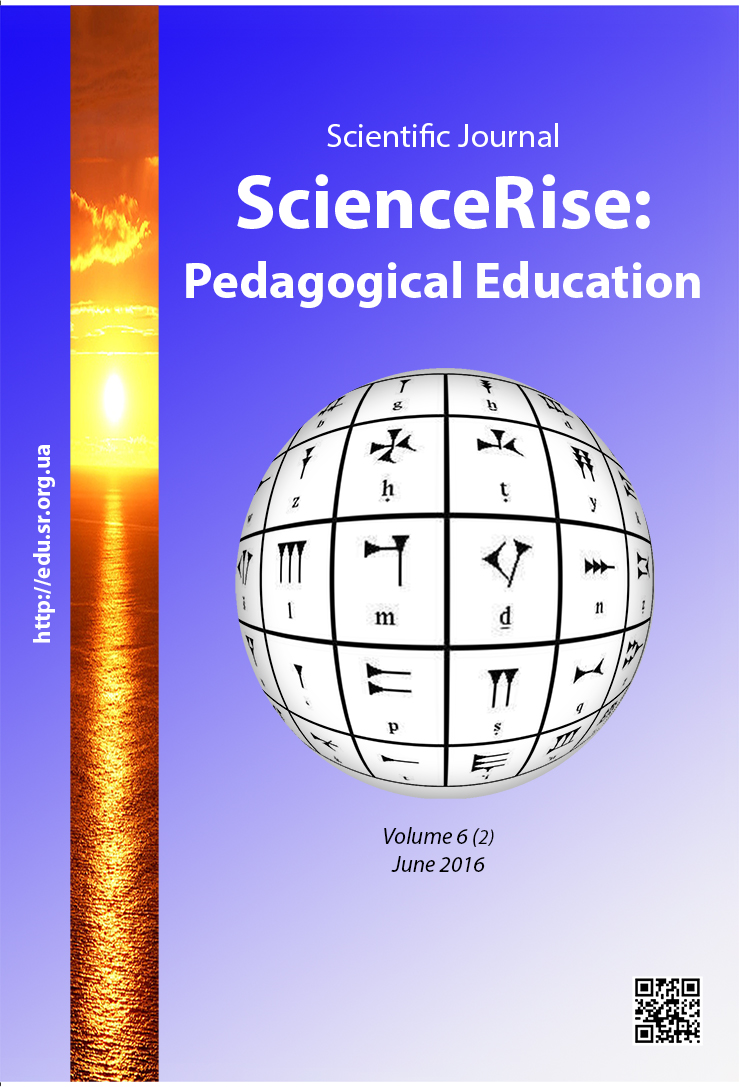Current issues of the professional preparation of the future social workers for the patronage work with elderly people
DOI:
https://doi.org/10.15587/2519-4984.2016.72718Keywords:
professional preparation, social worker, patronage work, readiness, person of elderly ageAbstract
There were elucidated the topical questions of the professional preparation of the future social workers for the patronage work with people of elderly age. There were determined, that this age category of population needs the specific approaches to the professional preparation of specialist in the aspect of their professional-psychological and professional-pedagogical preparation for the work with elderly people. There was realized an analysis of the series of literature sources on the given topic of our research in the works of the native and foreign famous authors. There was given the author’s definition of the notion “readiness for the patronage work with elderly people”. There was considered the dynamics of attitude of the future social workers to the patronage work with elderly people. The author determined components, criteria, indicators and levels of readiness of the future social workers for the patronage work. It was proved, that the constructed model favors the formation of readiness for the patronage work with elderly people in students of the specialty “Social work”. There was grounded an expediency of elaborated scientific-methodological support at the stage of formation of experimental research
References
- Karpenko, A. G.; Harchenko, S. Ja. (Ed.) (2007). Professional training of social workers in terms of university education, scientific and methodical, organizational and technological aspects. Drohobych: Kolo, 374.
- Uznadze, D. N. (1997). Theory settings. Voronezh; Moscow: Institut prakticheskoj psihologii; NPO «MODJeK», 448.
- Dyachenko, M. I., Kandybovich, L. A. (1976). Pedagogical problems for readiness activities. Minsk: IZ-in BSU, 175.
- Duray-Novakova, K. M. (1983). Professional Formation of readiness for studentov pedahohycheskoy activity. Moscow, 356.
- Slastenyn, V. A., Slastenin, V. A., Isaev, I. F., Shijanov, E. N.; Slastenin, V. A. (Ed.) (2002). Pedagogika. Moscow: Academy, 576.
- Zvjerjeva, I. D., Bezpal'ko, O. V., Harchenko, S. Ja. et. al; Zvjerjeva, I. D., Laktionova G. M. (Eds.) (2003). Social work in Ukraine teach. guidances. Kyiv: Science. World, 233.
- Capska, A. Y. (2011). Sotsialna job. Kyiv: Publishing House "Word", 400.
- Kozubovska, I. V., Dosin, A. R. (2008). Using the experience of Great Britain in the practical training of social work in Ukraine. Pedagogichna nauka: istorija, teorija, praktyka, tendencii' rozvytku, 1. Available at: http://intellect-invest.org.ua/ukr/pedagog_editions_e-magazine_pedagogical_science_arhiv_pn_n1_2008_st_29/
- Mischyk, L. I. (1997). Theoretical and methodological foundations of social teacher training in higher education. Zaporozhye, 359.
- Andrushhenko, V. P., Beh, V. P., Lukashevych, M. P., Mygovych, I. I., Pinchuk, I. M. (2001). Social Work. Book. 3. Kyiv: UDTSSSM, 332.
- Poltavets, V. (2000). Social Work in Ukraine: the first steps. Kyiv: Type. house "KM Academy", 233.
- Semygina, T. V., Gryg, I. M. (Eds.) (2004). Social work. Kyiv: Type. House "Kyiv-Mohyla Academy", 166.
- Arkhipova, S. P., Majboroda, G. Y. (2002). Social Pedagogy. Cherkasy-Uzhhorod, 154.
- Vaynola, R. X. (2009). Teaching principles of personal development of the future social teacher in the course of training. Kyiv, 542.
- Zavatska, L. M. (2008). Technology professional activity of social teacher. Kyiv: ed. House "Word", 240.
- Pyesha, I. V. (2007). The specifics of socio-pedagogical training as a form of active learning. Nauk. chasop. NPU im. M. P. Dragomanova. Kyiv: NPU, 5, 317.
- Petrochko, Z. V., Kondrashevs'ka, T. M. (2001). Vocational training social workers to work: the experience of. Kyiv: Nats.ped. University of them. M. P. Dragomanova, 48.
- Polishchuk, V. A., Nychkalo, N. G. (Ed.) (2006). Theory and methods of training social workers in terms of lifelong learning. Ternopil: TNPU, 424.
- Aleksjuk, A. M., Beh, I. D., Demkiv, T. F., Jermakov, I. G., Zavads'kyj, I. O.; Sazonenko, G. S. (Ed.) (2000). Future educational technologies. Kyiv: Gopak, 560.
- Zjazjun, I. A.; Nychkalo, N. G. (Ed.) (2004). Nychkalo Nellja Grygorivna. Proftehosvita Ukrai'ny: XX stolittja. Kyiv, 694–695.
- Sysoievа, S. O., Krystopchuk, T. Je. (2009). Teaching experiment in research of continuous professional education. Luck: JSC "Volyn regional printing", 460.
- Shpak, А. T. (2001). Theory and practice of teacher training for economic education students in the system of continuous education. Kyiv, 454.
- Bocharova, V. G. (1999). Professyonal Social work: personality-oriented hiking. Moscow: Ross. Academy science, 184.
- Golubenko, T. O. (2015). Formation of future social workers to the patronage of the elderly. Kyiv, 227.
- Goncharenko, S. U. (2008). Teaching research: Methodological advice for young scientists. Kyiv; Vinnitsa: Dov "Vinnitsa", 278.
- Lukashevich, M. P., Semygina, T. V. (2009). Social work (theory and practice). Kyiv: Caravel, 368.
- State industry standard specialty "Social work" (2005). Kyiv, 273.
- Babansky, J. K. (1987). Intensification learning process. Moscow: Knowledge, 78.
Downloads
Published
How to Cite
Issue
Section
License
Copyright (c) 2016 Тетяна Олександрівна Голубенко

This work is licensed under a Creative Commons Attribution 4.0 International License.
Our journal abides by the Creative Commons CC BY copyright rights and permissions for open access journals.
Authors, who are published in this journal, agree to the following conditions:
1. The authors reserve the right to authorship of the work and pass the first publication right of this work to the journal under the terms of a Creative Commons CC BY, which allows others to freely distribute the published research with the obligatory reference to the authors of the original work and the first publication of the work in this journal.
2. The authors have the right to conclude separate supplement agreements that relate to non-exclusive work distribution in the form in which it has been published by the journal (for example, to upload the work to the online storage of the journal or publish it as part of a monograph), provided that the reference to the first publication of the work in this journal is included.







